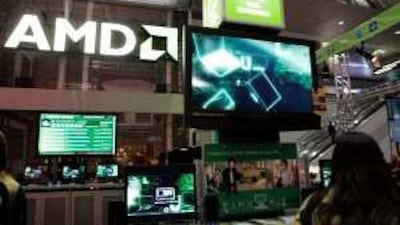AMD, the computer chip maker that will soon enter a joint venture with Abu Dhabi's Mubadala Development, is reshaping its approach to its most important market in advance of the deal being finalised. In two new lines of chips released in the past week, the company has focused its efforts on niche markets, saying it will no longer be as aggressive in competing in every category. It has also fine-tuned its pricing strategy, attempting to out-manoeuvre the competition.
AMD, based in California, remains a distant but important competitor to Intel, which dominates the market for the central processing units (CPUs) that are needed in every computer. It has posted a series of losses in recent years as it attempts to compete with a far larger and better-funded adversary in a business requiring huge investments in research and development. Its deal with Mubadala will see the government-owned investor increase its stake in the company to 20 per cent, and spin off its chip manufacturing system into a new company that will be majority owned by the Mubadala-affiliated Advanced Technology Investment Company (ATIC).
AMD said this would allow it to focus its resources on chip design and marketing, while the production business, tentatively named The Foundry Company, could become a specialised contract manufacturer for AMD and other customers. ATIC officials hope to eventually build microchip fabrication plants, known as fabs, in Abu Dhabi. The AMD chairman, Hector Ruiz, will be in Abu Dhabi this week to speak at the Future Capitals World Summit.
ATIC, created in the lead-up to the AMD deal, has said it would make a number of technology investments in the coming years, but has not yet spoken publicly about its strategy or plans. People familiar with the company say it is awaiting completion of the AMD transaction before discussing this in more depth. The deal was approved by US regulators last week and is expected to be concluded this month. At the Consumer Electronics Show in Las Vegas, which ends today, AMD revealed the products it hopes will boost its market share in the coming year.
At the premium end of the market, the company has released its most powerful chip, designed to compete with the most popular products from Intel. But the Phenom II, as it is named, will cost almost half the price of competing chips. The company hopes that at the high end of the market consumers will continue to spend but become more price-focused, giving an advantage to a powerful, low-cost chip. Dell, the world's second-largest PC manufacturer, said it would use the chip in a new version of its popular XPS line of top-end desktop computers targeted at video gaming.
Last November, Intel launched the i7 line of chips, which are the fastest PC chips yet made. The technology platform for i7 is considered a full generation ahead of AMD's line-up, but the chips are expensive, energy-intensive and need other top-end equipment to support them. Much of Intel's sales growth in the past year has come from its Atom range of chips, which are smaller, cheaper and less energy-intensive than typical CPUs. They are designed for use in a popular new category of lightweight, low-cost laptops known as netbooks, which accounted for almost all the growth in laptop sales last year.
AMD said last week it did not intend producing a chip to compete with the Atom, adding the segment was not profitable enough. Instead, it released its own line of smaller chips, named Yukon, which are designed for small, thin, powerful laptops such as Apple's MacBook Air or the Sony Vaio TZ. The Yukon chips were more expensive than Intel's Atom, but also more profitable, AMD said. The company described the target market for Yukon as premium "ultra-thin" notebooks, rather than lower-cost netbooks, emphasising better performance in handling processor-intensive applications such as games and multimedia.
tgara@thenational.ae

